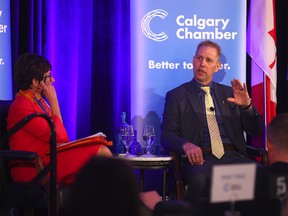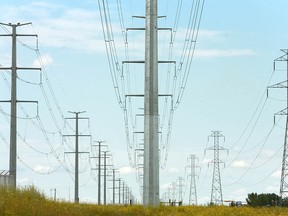[ad_1]
Alberta’s power market is ”not working,” and the best way to help consumers and businesses grappling with soaring bills is to reform the electricity market for the short and long term, says the province’s utilities minister.
Speaking to a Calgary Chamber of Commerce luncheon on Tuesday, Affordability and Utilities Minister Nathan Neudorf said the province is proceeding with a series of reviews by various agencies into Alberta’s power system, which should wrap up early next year.
These include the contentious provincial pause on approving new renewable projects and a study into the broader structure of Alberta’s deregulated market.
Power prices have soared in the past two years, even with an influx of wind and solar power projects onto the grid, he said during his address.
“The market is not working as intended,” Neudorf told the crowd.
“We’re not just capping (prices) and putting a Band-Aid on it for a short period of time. We’re making key investments to allow for that stabilization.”
On Tuesday, the Alberta NDP called for the province to hold an independent investigation into high electricity rates.
It also blasted the UCP government for putting a moratorium on approving new renewable projects, and also questioned the permitted practice in Alberta of allowing economic withholding by suppliers.
Data from the Alberta Electric System Operator (AESO) shows power pool prices have averaged $139 per megawatt-hour (MWh) this year, compared with $153 during the same period last year.
But that’s up sharply from an average of about $102 per MWh seen in 2021 and less than $50 during the first year of the pandemic in 2020.
Residential and business consumers have been feeling the pinch in their monthly bills this year.
“From a business standpoint, this is absolutely something we’re focused on and very concerned about,” said chamber CEO Deborah Yedlin.

The regulated rate option — also known as the default rate — for electricity spiked to a record 31.9 cents per kilowatt-hour (kWh) in Calgary in August. It has dropped to 19.36 cents for December.
As the AESO is looking at market reforms, “what our market needs is either better regulation or more competition,” NDP MLA Nagwan Al-Guneid told reporters.
“We need an independent investigation into power prices. We need to get a full understanding of what is driving prices. Most importantly, we need solutions that will help Albertans.”
The question is how quickly any relief will arrive for weary consumers as various government studies and reviews are taking place.
In the throne speech in October, the UCP government vowed to overhaul the electricity system as it undergoes significant changes, such as the rapid growth of renewables, the development of new technologies and the push to decarbonize.
Ottawa is calling for provincial power grids to be net-zero by 2035, while the Smith government is demanding a 2050 timeline.
A review is now underway on the future of the regulated rate option, another study is being done by the Market Surveillance Administrator (MSA) — the province’s electricity market watchdog — and AESO’s process is also moving forward.
“We are looking at the sustainability of the market structure,” AESO chief executive Michael Law said Tuesday, noting recommendations will be given to the government in February.
“Then, there will obviously be an ongoing assessment, once they determine where their policy direction goes. There’s a process of design and implementation that will take a number of years to implement.”
-
 Province targeting electricity stability as primary affordability focus as fuel tax set to return
Province targeting electricity stability as primary affordability focus as fuel tax set to return -
 Varcoe: Alberta says power prices are too high, vows overhaul of electricity system
Varcoe: Alberta says power prices are too high, vows overhaul of electricity system -
 2035 or 2050? A realistic clean electricity goal for Alberta could fall between the two
2035 or 2050? A realistic clean electricity goal for Alberta could fall between the two
For the renewable sector, which has attracted billions of dollars of new investment in the past decade, the time for answers is sooner, not later.
Alberta saw 1,391 megawatts of installed renewable capacity added across the province last year, representing more than three-quarters of all additions across the country.
The pause on project approval surprised many in the sector and it’s slated to run until Feb. 29. According to data from the Canadian Renewable Energy Association, construction of previously approved developments with a combined 1,240 megawatts of capacity is still underway.
The Alberta Utilities Commission is examining several issues around proposed projects being approved, including the use of farmland, the effect on “viewscapes” and the potential of mandatory reclamation security requirements for new developments.
“What needs to happen is we need the pause to lift as soon as possible,” Evan Wilson of the Canadian Renewable Energy Association said in an interview.
“We need policy clarity on the way that we are moving forward on all of the regulatory issues that are occurring.”

Neudorf insisted the pause on renewables will “come off, no matter what” by the end February. The government will then put forward a comprehensive path forward for market reform, as early as the beginning of March.
And with more thermal generation being built and coming onto the market next year, power prices are expected to come down, he said.
“We’re also looking at key directives to address transmission, distribution, retail and administration costs,” Neudorf told reporters after the speech.
“I’m very confident we will not only be able to stabilize it, but bring it down to historical prices of less than 10 cents a kilowatt-hour, as well as the all-in cost to the ratepayer being at a much more affordable level.”
Chris Varcoe is a Calgary Herald columnist.
[ad_2]
You can read more of the news on source



